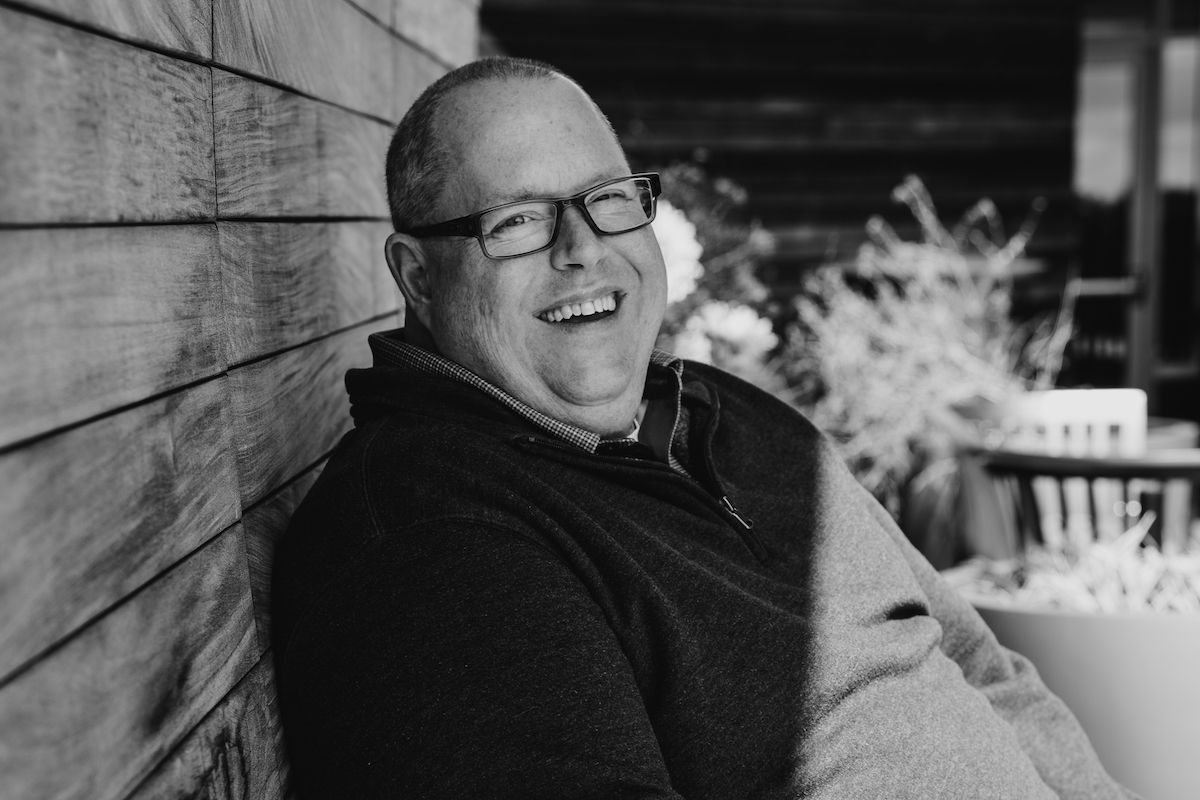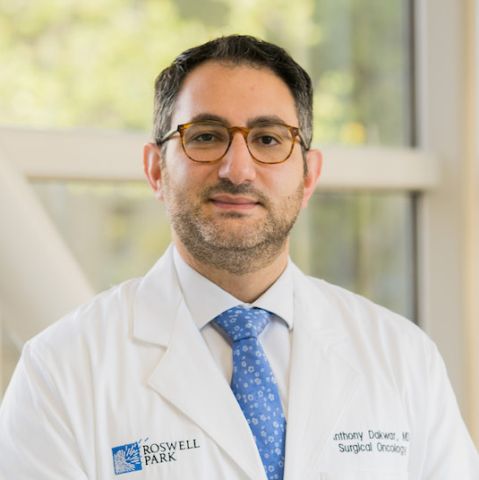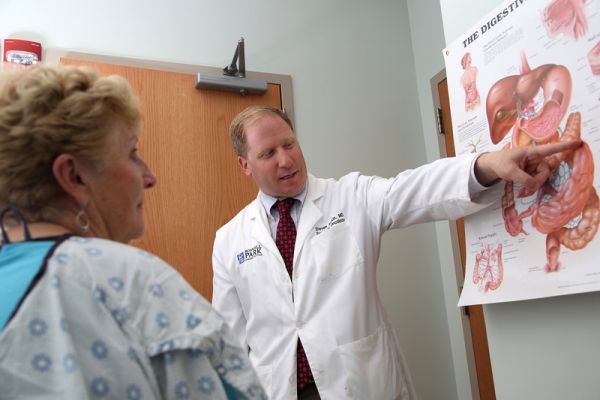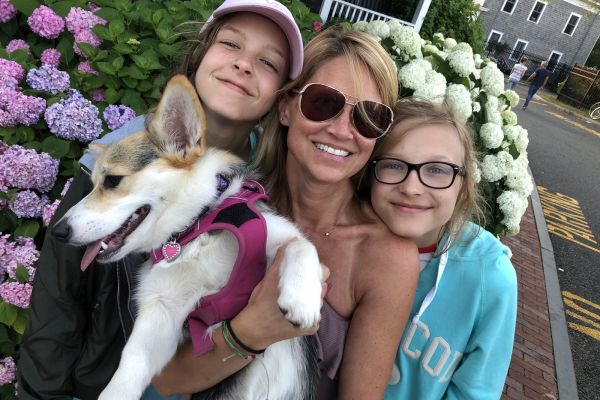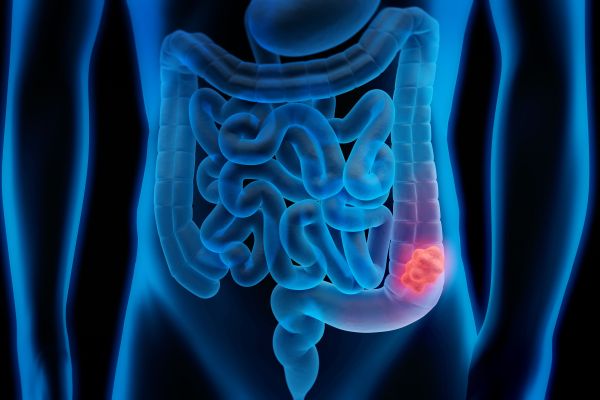A complicated medical history posed unique challenges for his cancer treatment
As a colorectal surgeon, Anthony Dakwar, MD, FACS, of Roswell Park Comprehensive Cancer Center, has seen plenty of challenging medical cases and quick recoveries. But the case of Michael Buechi, 52, is one he’ll remember for a long time.
This February, Dr. Dakwar performed what is usually a routine surgery on Michael, removing about 18 inches of his colon. “Typically, most patients stay in the hospital about three days after this type of surgery,” says Dr. Dakwar. But given Michael’s’ daunting medical history, he was anything but typical. “As a medical team, we needed to take extra precautions in Michael’s case. And given everything he’s been through, this year especially, we were all pretty amazed at his quick recovery.”
His patient is quick to agree. “Yeah, you could say I’m a medical anomaly who’s had a really rough year,” says Michael (also known as “Beaky,” the pronunciation of his last name, to his friends and family).
Medical woes began with a rare infection
Michael’s rough year started in May 2021, on a golf trip with friends. “Between breaks for winter and COVID, water in the golf course’s sprinkler system had stagnated, allowing a build-up of bacteria,” Michael says. “After a few days of golfing, I developed a fever, aches and respiratory issues. I was initially misdiagnosed with COVID, but it turned out to be Legionnaire’s disease, a severe and often fatal form of pneumonia. I was the only one on the golf trip who got it, possibly because I have several pre-existing medical conditions. I am overweight and have pre-diabetes and nonalcoholic steatohepatitis (NASH), an aggressive form of fatty liver disease that damages the liver through inflammation and scarring.”
Michael’s treatment for Legionnaire’s disease started with a harrowing 68 days in the ICU of a local hospital. “At one point, my blood oxygen level was 60% (levels below 85% are considered dangerous), and I was hooked up to an ECMO device – which basically functions as a heart and lungs outside the body. My platelet levels were so low that I needed a platelet transfusion. I also suffered from blood clots, lost 100 pounds and had severe muscle atrophy.”
Once his respiratory issues were under control, Michael was released from the hospital and spent a month in a rehabilitation facility. “I was so weak that I had to re-learn how to talk, eat and walk. After that, I went home and my wife Valerie and daughter Addy helped me recover over the next few months.”
Why Roswell Park for colorectal cancer?
Find out what makes Roswell Park unique in diagnosing and treating colorectal cancer.
Learn MoreRoutine screening finds colon cancer
After regaining his strength, Michael made an appointment for his first routine colonoscopy. “And, in keeping with a terrible medical year, I learned I had nine polyps and a tumor in my colon,” Michael says. “As soon as I heard that the tumor was malignant, without hesitation, I chose to be treated at Roswell Park. After all, when you have a world-class state-of-the art cancer center 20 minutes from your home, why would you go anywhere else?”
Michael quickly experienced the advantages of Roswell Park’s comprehensive, multidisciplinary approach to treating cancer. “I had some immediate concerns when I reviewed Michael’s medical records,” Dr. Dakwar admits. “He’d been on life support not even six months earlier. He was still on blood thinners due to blood clots in his lungs from his respiratory infection and there was a higher risk of excessive bleeding due to liver disease."
"At Roswell Park, we take great pride in providing individualized treatment plans tailored for each of our patients. After examining Michael, I presented his case to our tumor board which included medical oncologists, surgical oncologists, radiologic oncologists, pathologists, hematologists and anesthesiologists, to determine the safest and most effective treatment plan for this high risk and medically complicated patient. For Michael, we determined that it would be best to do surgery first, using the state-of-the-art, minimally invasive da Vinci system, and then consider chemotherapy later.”
A care plan focused on his individual needs
“I was totally on board with this plan,” Michael says. “I felt confident with Dr. Dakwar’s decisions. I’m a guy who asks a lot of questions and, especially this last year, I’ve gotten a lot of vague answers from many doctors. But I noticed right away that everyone I spoke to at Roswell Park, and especially Dr. Dakwar, took the time to clearly and thoroughly answer my questions.” Michael’s surgery in February turned out to be one of the easiest treatments he’s had in the past year. “It went flawlessly. I had no excessive bleeding or problems with the anesthesia. The da Vinci system in the hands of Dr. Dakwar is amazing. Even as recently as 10 years ago, there’s no way patients would have been able to have this type of surgery with just a few minor incisions. But just hours after my surgery, I was able to eat soft food and do some laps around the hospital hallway, and two days later, everyone was amazed when I was cleared for discharge.”
Now eight weeks post-surgery, Michael is cancer-free. He continues to be monitored by Dr. Dakwar and will eventually be treated with a combination of customized oral and intravenous chemotherapies.
“Thanks to referrals from Dr. Dakwar, I am working with Amanda Przespolewski, DO, who specializes in hematologic oncology and also will be seen at Roswell Park by a consulting hepatologist to address my liver disorder before I begin my chemotherapy regimen," he says.
While it has indeed been a rough year for him and his family, Michael is focused on the future. “Life’s too short to look backwards. Instead, I’m working on what I can control: my attitude and ways I can improve my health and better balance my work and home life. I’m trying to make healthier food choices and I exercise at the gym, do chores around the house and spend time outside with my family and my dogs. And I can’t wait to go golfing again. Honestly, all things considered, I feel great.”
Editor’s Note: Cancer patient outcomes and experiences may vary, even for those with the same type of cancer. An individual patient’s story should not be used as a prediction of how another patient will respond to treatment. Roswell Park is transparent about the survival rates of our patients as compared to national standards, and provides this information, when available, within the cancer type sections of this website.
